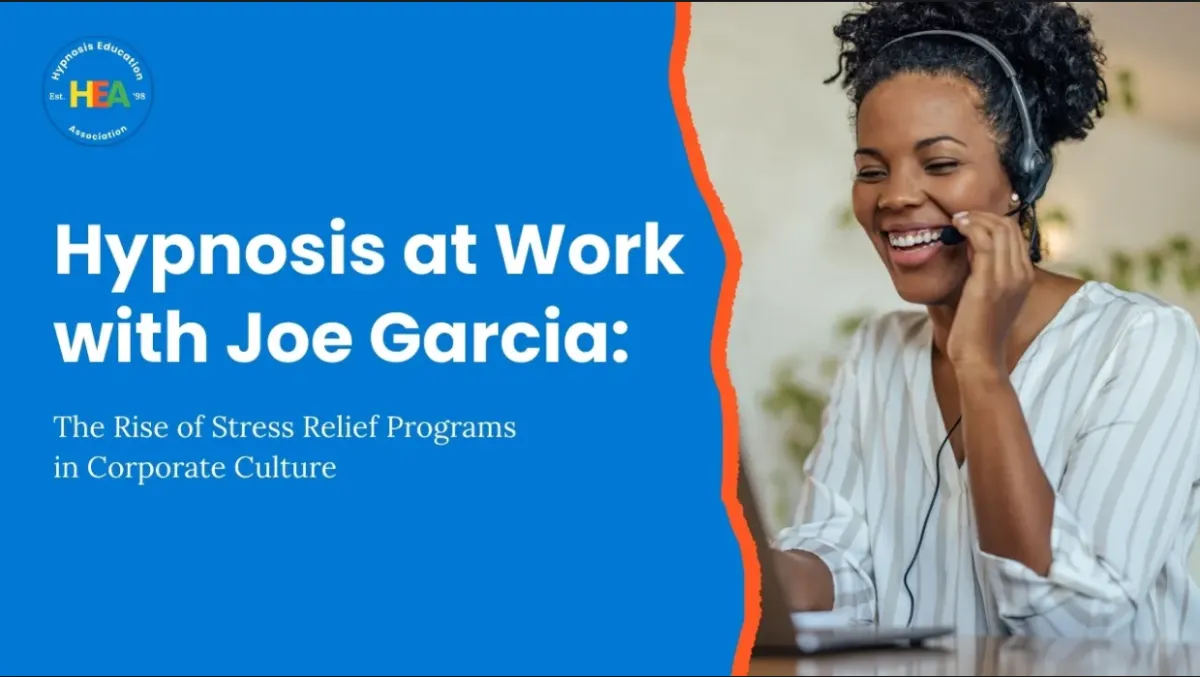
Hypnosis at Work: How Stress Relief Hits Corporate Culture
Hypnosis at Work with Joe Garcia: The Rise of Stress Relief Programs in Corporate Culture
What if the key to a more productive, less stressed workforce wasn’t another software or leadership seminar, but something as ancient and misunderstood as hypnosis?
That’s exactly the conversation that unfolded in a powerful and revealing hypnosis education event led by Joe Garcia, a business professional turned hypnotherapist. This event highlighted how hypnosis is not only entering boardrooms and breakrooms but changing the way companies tackle burnout, employee stress, and overall well-being.
In this blog, we’ll walk through the real-world experiences, strategies, pricing insights, and ethical considerations of bringing hypnosis into the corporate world, all straight from the session, with nothing added and nothing imagined.
Breaking the Stigma: Educating Corporations About Hypnosis
Right from the start, Joe addressed the elephant in the room: the word “hypnosis” still carries outdated and often negative connotations. That’s one of the reasons the Hypnosis Education Association (HEA) exists, to shift public understanding.
But Joe didn’t wait for the stigma to dissolve. Instead, he tackled it head-on by educating wellness coordinators and HR departments about how hypnosis really works. This direct approach made a surprising impact. One of the first organizations to respond positively? Royal Caribbean. Their wellness team loved the concept and invited Joe to multiple locations to introduce hypnosis to their employees.
This wasn’t just a win for Joe; it was a signal that corporate culture is starting to open up to new, holistic ways of addressing burnout and mental overload.
Hypnosis as a Scalable Solution for Employee Burnout
Burnout isn’t just a buzzword; it’s a workplace epidemic. The World Health Organization defines it as a syndrome caused by unmitigated workplace stress. The signs?
Mental and physical exhaustion that doesn’t go away, even after rest.
Disconnection from purpose or passion makes once-engaged employees feel numb or indifferent.
Severe drop in productivity, leading to missed goals, low performance, and high turnover.
Joe recognized that many corporations are quietly struggling with these issues. His sessions offer a proactive solution, hypnosis that helps people reconnect, recharge, and reframe.
His method includes a before-and-after questionnaire, allowing organizations to measure real data around changes in stress, mood, and productivity. The goal is simple: track how people feel before and after hypnosis. And the results? Companies are noticing a clear shift.
How to Price Hypnosis for Corporate Settings
One of the most practical sections of the event focused on pricing, how much can (and should) you charge for hypnosis in a corporate environment?
Joe shared that his standard rate for one-on-one sessions in Miami is $300 per session, or around $1,500 for a five-session package. But corporate hypnosis is a different ballgame.
Through market research, Joe found that group sessions with 20–25 employees are often priced at $2,500 to $3,000 per session. And yes, the market is willing to pay for it, especially when the alternative is stressed-out, disengaged teams.
Joe has even submitted a six-figure proposal to Royal Caribbean to offer sessions to their team at scale. In such contracts, bulk pricing comes into play. If you're normally charging $300 per session, a large contract might average out to $100 per session, but across hundreds or even thousands of sessions.
And these aren't long, drawn-out meetings. In the corporate world, time is money. So most sessions last 30 to 60 minutes max, allowing more employees to cycle through while still receiving value.
What Experience Do You Need to Start Offering Hypnosis to Corporations?
A key question raised in the session was: “How experienced do you need to be to charge corporate rates?” Joe’s answer was both empowering and honest.
He’s been practicing hypnotherapy for just two years, but he brings over 15 years of business experience, an MBA, and is currently working on his DBA (Doctorate of Business Administration). His business background gave him confidence and credibility, and he emphasized that the ability to lead, connect, and deliver results matters more than the number of years you've been hypnotizing people.
His advice? If you can show up with confidence, lead a room, and offer measurable outcomes, you’re ready. You don’t need to have decades of experience to serve corporations. You just need the right positioning and preparation.
Who Benefits from Corporate Hypnosis? (Hint: It's Not Just Executives)
While executives are certainly candidates for this kind of support, hypnosis benefits employees at all levels, from entry-level customer service reps to seasoned sales professionals.
Salespeople were specifically highlighted as one of the most stressed groups in the workforce. Joe, having a background in sales himself, noted how often he hears from people who say things like, “I wish you were around when I needed you, I had to leave sales because of burnout.”
Hypnosis can help reduce that pressure, restore confidence, and even improve performance by helping employees reconnect with their purpose and mental clarity.
Collecting Real Results: The Power of Pre- and Post-Session Surveys
Joe emphasized the importance of questionnaires, both for research and for professional practice. Before every session, he asks participants:
How do you currently feel?
What are your perceptions of hypnosis?
Then, after the session, he repeats the process to measure the shift.
These forms help quantify results, especially around burnout symptoms like chronic stress, low motivation, and poor productivity. And over time, those responses can help companies make data-backed decisions about continuing or expanding hypnosis services.
Even if you're not conducting formal research, collecting this kind of feedback builds credibility and shows corporations that you’re serious about results.
Ethics and Consent: Protecting Clients and Your Practice
In any wellness practice, ethics matter. Hypnosis is no exception, especially when conducted in group or workplace settings.
Joe stressed the importance of having each participant sign a disclosure form. Even if the employer brings you in, hypnosis must always be voluntary.
Why? Because:
Some people may have personal or religious objections to hypnosis.
Others may feel pressured to participate because it’s happening at work.
To protect both the practitioner and the client, Joe brings the form himself and ensures it’s signed before any session begins. He recommends not relying on the company to distribute or collect these forms, because it often doesn't get done in time or properly.
The Ripple Effect of Corporate Wellness
Joe’s journey began with a simple mission: to serve business owners and leaders, so they could, in turn, create better environments for their teams and communities. While Google sent him every kind of client under the sun, his heart remained with entrepreneurs and corporate influencers, the people who impact others.
There’s a real ripple effect here. When executives, managers, and employees are grounded and balanced, entire organizations shift. Productivity improves. Stress levels drop. The human experience at work becomes more livable.
As the host beautifully summarized, “If we work with the executives and corporate teams, then we get to create a trickle-down of people who can breathe again.”
Making Hypnosis Corporate-Ready: A Practical Framework
One of the most valuable takeaways from the session was how corporate-ready hypnosis isn’t just about delivery, it’s about structure. Joe provided a clear example of how to prepare and present your offering in a way that resonates with decision-makers.
For instance, before ever walking into a boardroom, Joe had done his homework. He didn’t just throw out a price. He looked at what others were charging, studied existing group hypnosis services, and learned that the $2,500–$3,000 range for group sessions was not only possible, it was already happening. Some practitioners were charging even more, especially if they had branded themselves specifically for corporate wellness.
This approach gave Joe the confidence to show up with authority. He wasn’t asking companies to take a leap of faith; he was showing them a calculated investment with comparable industry benchmarks. And when Royal Caribbean said yes, it validated what he already knew: the market is ready.
He also shared that, for corporate contracts like the one proposed to Royal Caribbean, the sessions are structured differently. Instead of deep 90-minute transformations, sessions are designed as “quick fixes” of 30–45 minutes, allowing more employees to rotate through. This shows that hypnosis can be both effective and efficient, a critical factor in the workplace where time is limited.
Confidence Matters More Than Credentials Alone
There was a particularly empowering moment in the discussion when a participant asked Joe how long he’d been practicing hypnosis. His answer, two years, was met with surprise.
What gave him credibility wasn’t just his hypnosis experience; it was the 15+ years of business experience, his MBA, and his doctoral research. But more than that, it was his confidence. He knew how to command a room, deliver results, and speak the language of corporate leadership.
This revealed something deeply important: you don’t need decades in hypnosis to enter this space. You just need to:
Have a service that creates real change
Know how to talk to corporate decision-makers
Be able to show the value clearly, with data and structure
Joe reminded everyone that if you can walk into a room and say, “I’m here to bless these overworked people today,” with presence and preparation, you’re already halfway there.
Hypnosis Is No Longer Fringe, It’s the Future of Workplace Wellness
The event wrapped with a powerful reminder: hypnosis isn’t just for stage shows or self-help circles anymore. It’s entering boardrooms. It’s being backed by evidence-based research. And it’s being embraced by major organizations like Royal Caribbean.
There’s even a growing body of academic work emerging, including studies from India and early research efforts right here in the U.S. As Joe completes his DBA research, the hope is that his findings will add to the growing body of evidence supporting the use of hypnosis in professional settings.
If you're a hypnotherapist wondering if this space is for you, it is, and now is the time.
Final Words: A Call to the Hypnosis Community
Joe’s journey isn’t just inspiring, it’s proof that hypnosis can belong in the corporate world. And if you’re a hypnotherapist, wellness provider, or coach considering this path, there’s space for you too.
Build your confidence. Develop your presentation. Know your pricing. Protect your ethics. And most importantly, lead with heart.
Because at the end of the day, as burnout rises and stress spreads, what workplaces need most is real, human relief, and you just might be the one to deliver it.
Ready to Explore Hypnosis in the Workplace?
If this conversation sparked your curiosity or affirmed your passion for helping people through hypnosis, don't miss your chance to go deeper. Join us at the upcoming HypnoConnect, hosted by the Hypnosis Education Association!
Learn from experts
Connect with like-minded professionals
Discover how to expand your impact in corporate wellness
Register now for HypnoConnect and become part of the growing movement that’s changing the way we think about stress relief at work.
Let’s bring transformation to more workplaces, together.
